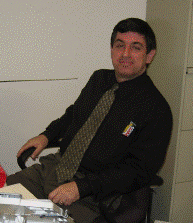
AnthonyFlood.com
Philosophy against Misosophy

*
My “Dialog” with Roger Ebert on Death
The following is my response to “Go Gently into That Good Night,” renowned film critic Roger Ebert’s eloquent expression of agnosticism in the face of his probable death from cancer. In his brief response, he graciously overlooked my lapse from mindfulness of the personal context of his thoughts. I tried to make amends in my follow-up. All this may be viewed on his blog. I encourage my visitors to become his as well.
May 6, 2009
If everything is burnt up in the inevitable collapse of the universe, what, in the end, are we contributing to? What does our “kindness” matter? As Bertrand Russell famously wrote in 1903:
“That man is the product of causes that had no prevision of the end they were achieving; that his origin, his growth, his hopes and fears, his loves and his beliefs, are but the outcome of accidental collocations of atoms; that no fire, no heroism, no intensity of thought and feeling, can preserve individual life beyond the grave; that all the labors of the ages, all the devotion, all the inspiration, all the noonday brightness of human genius, are destined to extinction in the vast death of the solar system, and that the whole temple of Man’s achievement must inevitably be buried beneath the debris of a universe in ruins—all these things, if not quite beyond dispute, are yet so nearly certain that no philosophy which rejects them can hope to stand. Only within the scaffolding of these truths, only on the firm foundation of unyielding despair, can the soul’s habitation henceforth be safely built.”
Henceforth? Safely? The impregnability of Russell’s (and your?) position is superficial, momentarily tenable only if one ignores the stake of contradiction driven through its heart (and the untenability of the empiricism that cannot make sense of the science it depends on). Russell may have written your credo, but how can it not drive you either to madness or despair? There may be, as you believe, nothing for us on the “other” side of our deaths. Unless, however, there is an everlasting divine life to which we contribute, a repository of experience that cherishes every worthwhile experience, then in the end nothing means anything, because a universe in ruins that began as “accidental collocations of atoms”—albeit ruins in a future distant enough for us to evade—stamps an expiration date on all value.
To consider the case for such a theistic ethical “contributionism” would, of course, require you to grapple with the arguments of a philosopher like Charles Hartshorne. It’s much easier to take the agnostic way out and suggest that that’s the best human beings can do.
On May 25, 2009, Mr. Ebert wrote:
A wonderful quotation. I believe Russell is correct, and he has not driven me to madness and despair. To the contrary, he helps me to understand.
Shortly after which I wrote :
Mr. Ebert, thanks for commenting on my post of May 6. What I should have done there and belatedly do now is salute the courage and honesty with which you are facing more immediately what we all face eventually. Apparent oblivious-ness to personal circumstance marred my expression of disagreement with your agnosticism. You seemed prepared for what Socrates said it was the office of philosophy to prepare one for [Phaedo 67e]. I find the spirit of your reflections Socratic, not Stoic, and therefore encouraging of dialog. I’m gambling, therefore, that you will receive this follow-up Socratically.
I appreciate your appreciation of Bertrand Russell’s eloquent confession of faith, but don’t understand your “understanding.” In seconding his thoughts, you are following the logician’s equivalent of a chess grandmaster. A grandmaster can blunder, however, inadvertently inviting checkmate. I claimed that his description of the universe’s ultimate heat death as a firm foundation for human living [“only on the firm foundation of unyielding despair can the soul’s habitation henceforth be safely built”] plunges a “stake of contradiction” through the heart of his worldview (and yours) and shatters the facade of its serenity.
I can see that it has not driven you either to madness or despair, neither of which, of course, I wish on you. As your interlocutor, however, I asked how you avoid either, logically how. Russell’s eschatology is but a protracted version of Sisyphus’s boulder-rolling exercise, whose existentialist point Camus sharpened to perfection.
I therefore surmise that a “blessed inconsistency,” a logical lapse, an intermittent forgetfulness of what one believes about this when one turns one’s attention to that, spares you the aforementioned mental afflictions. It cannot, however, spare your position the fate of basic incoherence, to which the only alternative is silence, a dilemma to which a man of letters like yourself cannot integrally be indifferent.
On a positive note, I suggested that an escape from the dilemma might lie in a worldview that made sense both of one’s virtually ineradicable ethical contributionism and one’s rationality. The latter human traits and Russell’s worldview are like matter and antimatter.
With respect,
Tony Flood
The "dialog" ended there.—A.F.
What is more likely, however ironic and tragic, is that in the name of restoring America’s “greatness,” you will only catalyze her descent into oblivion.
January 17, 2009